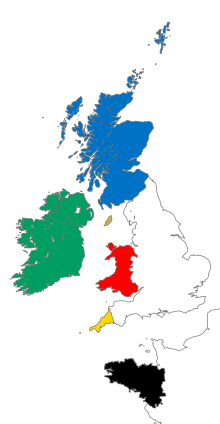Cornish Foreshore Case
The Cornish Foreshore Case was an arbitration case held between 1854 and 1858 to resolve a formal dispute between the British Crown and the Duchy of Cornwall over the rights to minerals and mines under the foreshore of the county of Cornwall in the southwest of England, most of which was owned by the duchy.[1] The arbitration led to the Cornwall Submarine Mines Act 1858, which confirmed those rights for the duchy between the high and low water marks but not beyond.[2] Sir John Patteson served as arbitrator, while the Rt. Hon. Thomas Pemberton Leigh, Baron Kingsdown represented the Duchy.
The issue
The problem which gave rise to the dispute was explained by the Solicitor-General during Parliamentary debates on the Cornwall Submarine Mines Bill, on 19 July 1858:
"the whole of the soil, and every thing under the soil, between high and low water mark on the shores of the kingdom, belonged to the Crown; and in numerous instances that right had been granted away, or passed to individuals by adverse possession against the Crown. In the case of the Duchy of Cornwall the difficulty had been this—very large grants were made of the soil and shore to the Prince of Wales in the time of Edward III. by charters, and great difficulty had always arisen with regard to the construction of those charters. That doubt had been further increased by innumerable dealings which had since taken place between the Crown and the Prince of Wales in the shape of statutes, other charters, and deeds of various kinds. In consequence it had in recent times become matter of extreme uncertainty whether, as regarded the soil between high and low-water mark, and even below low-water mark, in the Duchy of Cornwall, the rights to minerals was in the Crown or the Duchy. In the year 1856 it was considered desirable that these doubts should be resolved, for it was found that the existence of doubts had had the effect of putting an end to various kinds of improvement, and checking mining operations."[3]
Cornwall Submarine Mines Act
The Cornwall Foreshore Dispute culminated in the Cornwall Submarine Mines Act 1858, described as, "An Act to declare and define the respective Rights of Her Majesty and of His Royal Highness the Prince of Wales and Duke of Cornwall to the Mines and Minerals in or under Land lying below High-water Mark, within and adjacent to the County of Cornwall, and for other Purposes".[4] The act, as originally passed, determined that:
"All Mines and Minerals lying under the Seashore between High and Low Water Marks within the said County of Cornwall, and under Estuaries and tidal Rivers and other Places (below High-water Mark), even below Low-water Mark, being in and Part of the said County, are ... vested in His said Royal Highness Albert Edward Prince of Wales and Duke of Cornwall in right of the Duchy of Cornwall as Part of the Soil and territorial Possessions of the said Duchy; but this Declaration is not to extend to the Mines and Minerals in or under Land below High-water Mark which is Part
and Parcel of any Manor, belonging to Her Majesty in right of Her Crown".[5]
See also
References
- ↑ Philip Payton. (1996). Cornwall. Fowey: Alexander Associates
- ↑ Text of section 8 of the Cornwall Submarine Mines Act 1858 as in force today (including any amendments) within the United Kingdom, from the UK Statute Law Database
- ↑ House of Commons Hansard (1858-07-19) Col. 1752
- ↑ "Cornwall Submarine Mines Act". Retrieved 13 January 2013.
- ↑ "Cornwall Submarine Mines Act". Retrieved 13 January 2013.
| ||||||||||||||||||||||||||
| ||||||||||||||||||||||||||||||||||||||||||||||||||||||
